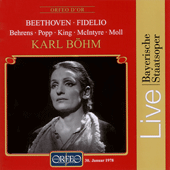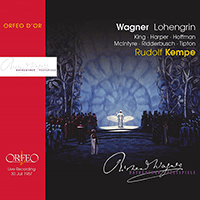Donald McIntyre
Donald McIntyre began his professional career as a teacher, while studying singing with Hubert Milverton-Carva in Auckland and giving his first concerts in New Zealand. After travelling to England he studied in London at the Guildhall School of Music with Ellis Keeler and in Essen with Clemens Kaiser-Breme, making his operatic stage debut in 1959 as Zaccaria / Nabucco with Welsh National Opera.
In 1960 McIntyre joined Sadler’s Wells Opera as a principal bass-baritone, appearing in more than thirty roles including Guglielmo / Così fan tutte, Kaspar / Der Freischütz, the title part in Verdi’s Attila and, in 1963, Pennyback Bill in the first fully-staged British production of Kurt Weill’s Aufstieg und Fall des Stadt Mahagonny. He moved to the Covent Garden Opera Company (later the Royal Opera Company) in 1967 and this remained his base for most of the rest of his career. Having first appeared at the Royal Opera House as Pizarro / Fidelio, McIntyre quickly made a strong impression, also in 1967, as Barak / Die Frau ohne Schatten under Solti. Apart from his Wagnerian repertoire, for which he became best known, his other roles in London included Jochanaan / Salome, Golaud / Pelléas et Mélisande, Escamillo / Carmen, Orest / Elektra, the Speaker / Die Zauberflöte, Scarpia / Tosca, Shaklovity / Khovanshchina, Kaspar and Nick Shadow / The Rake’s Progress. He also took the leading part of Axel Heyst in the 1970 premiere of Richard Rodney Bennett’s Victory and Prospero in the British premiere of Luciano Berio’s Un re in ascolto in 1989 (repeated at the Paris Opera Bastille in 1991).
After appearing as Donner / Das Rheingold (1967) and Kothner / Die Meistersinger von Nürnberg (1969), McIntyre sang his first major Wagnerian roles at Covent Garden in 1971: Klingsor / Parsifal under Goodall and Kurwenal in Solti’s farewell production of Tristan und Isolde. Shortly afterwards in the same year he sang his first Wotan / Der Ring des Nibelungen under Edward Downes. This was followed by the title role in Der fliegende Holländer (1972), Amfortas / Parsifal (1973) and Telramund / Lohengrin (1977).
Since 1967 McIntyre had been active at the Bayreuth Festival, making his debut there as Telramund (also 1968, 1971–1972), followed by the Dutchman (1969–1971, 1981), Klingsor (1968, 1970, 1972), Kurwenal (1974–1977), Amfortas (1987–1988), the Wanderer / Siegfried (1973–1974) and Wotan (1975–1980), including the centenary Ring production of 1976, conducted by Boulez.
It was as Wotan, in a complete Ring cycle of 1975, that McIntyre first appeared at the Metropolitan Opera, New York. He also sang Gunther / Götterdämmerung in the same cycle and continued to perform at the Met up until 1996. Roles there included Pizarro, Telramund, the Dutchman, Orest, Kurwenal, the Speaker, Klingsor, Shaklovity, Hans Sachs / Die Meistersinger von Nürnberg, Count Waldner / Arabella and Dr Kolenatý / The Makropoulos Case.
McIntyre made the transition to being a major European singer with ease and appeared frequently at such major opera houses as La Scala, Milan, the Vienna State Opera, the Hamburg State Opera, the Deutsche Oper, Berlin and most notably the Bavarian State Opera, Munich, where he sang the title role in Hindemith’s Cardillac and Balstrode / Peter Grimes in addition to his usual repertoire. A notable late role was Gurnemanz / Parsifal for the Welsh National Opera under Reginald Goodall.
By the 1990s McIntyre was singing less frequently and in 1992 he was knighted, a fitting conclusion to an extremely distinguished career. Nonetheless in 2005 he sang Wotan in Das Rheingold from the pit at Covent Garden when Bryn Terfel was indisposed.
A man of large build, he made an immediately imposing figure on stage. His voice was powerful and ideally suited to the Wagnerian repertoire in which he made his mark.
© Naxos Rights International Ltd. — David Patmore (A–Z of Singers, Naxos 8.558097-100).


















